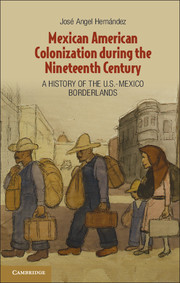 Mexican American Colonization during the Nineteenth Century
Mexican American Colonization during the Nineteenth Century Book contents
- Frontmatter
- Contents
- Figures
- Acknowledgments
- Introduction
- Part I Migration to Mexico in an Age of Global Immigrations
- Chapter One From Conquest to Colonization
- Chapter Two Postwar Expulsions and Early Repatriation Policy
- Part II México Perdido and the Making of Postwar Repatriation Programs Along the Borderlands
- Chapter Three Postwar Repatriation and Settling the Frontiers of New Mexico
- Chapter Four Repatriations Along the International Boundary
- Part III The Local Mixing, Unmixing, and Remixing of a Repatriate Colony in Chihuahua
- Chapter Five The 1871 Riot of La Mesilla, New Mexico
- Chapter Six Colonizing La Ascensión, Chihuahua
- Chapter Seven Anatomy of The 1892 Revolt of La Ascensión, or the Public Lynching of Rafael Ancheta
- Conclusion Repatriating Modernity?
- Bibliography
- Index
- References
Chapter Six - Colonizing La Ascensión, Chihuahua
The Prehistory of Revolt
Published online by Cambridge University Press: 05 June 2012
- Frontmatter
- Contents
- Figures
- Acknowledgments
- Introduction
- Part I Migration to Mexico in an Age of Global Immigrations
- Chapter One From Conquest to Colonization
- Chapter Two Postwar Expulsions and Early Repatriation Policy
- Part II México Perdido and the Making of Postwar Repatriation Programs Along the Borderlands
- Chapter Three Postwar Repatriation and Settling the Frontiers of New Mexico
- Chapter Four Repatriations Along the International Boundary
- Part III The Local Mixing, Unmixing, and Remixing of a Repatriate Colony in Chihuahua
- Chapter Five The 1871 Riot of La Mesilla, New Mexico
- Chapter Six Colonizing La Ascensión, Chihuahua
- Chapter Seven Anatomy of The 1892 Revolt of La Ascensión, or the Public Lynching of Rafael Ancheta
- Conclusion Repatriating Modernity?
- Bibliography
- Index
- References
Summary
INTRODUCTION
The repatriation of the Mexican populace, as we have read in previous chapters, occurred largely from the 1830s to the 1850s, but by the 1870s the federal government had seemingly forgotten how to foment a viable colonization program. Once the earlier projects of the postwar period were implemented and executed, the Mexican government, according to the state ofi cials searching for federal laws to grant lands, did not continue applying the postwar lessons of a colonization law that addressed the particularities of Mexican American colonization, at least not until the period from 1875 to 1883. The case of La Ascensión may serve as a microcosm into the inner workings of how Mexico went about settling colonies along the northern frontier during the 1870s.
Letters requesting repatriation to Mexico are few and far between during the period between 1855 and 1875, due primarily to the ongoing wars against the Indios Bárbaros and, according to government officials, “administrative disorder.”” Not until the Porfirian period do we see an increase in repatriation requests, perhaps inl uenced in large measure by the case of La Ascensión, including an increase in advertisement of the law proper. Moreover, the case of La Ascensión influences the foundation of the 1883 Land and Colonization Law that established the first modern colonization program outlining preferential treatment for the Mexican American population residing outside of the country. La Ascensión was a watershed in terms of actually implementing and administering a repatriation policy, and ultimately forced the government to pass legislation concerning the colonization process.
- Type
- Chapter
- Information
- Mexican American Colonization during the Nineteenth CenturyA History of the U.S.-Mexico Borderlands, pp. 181 - 202Publisher: Cambridge University PressPrint publication year: 2012


